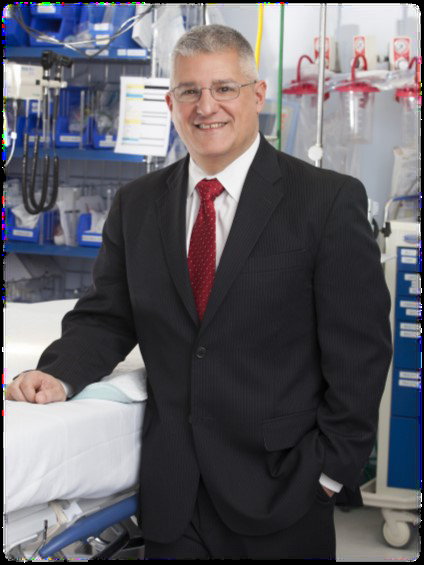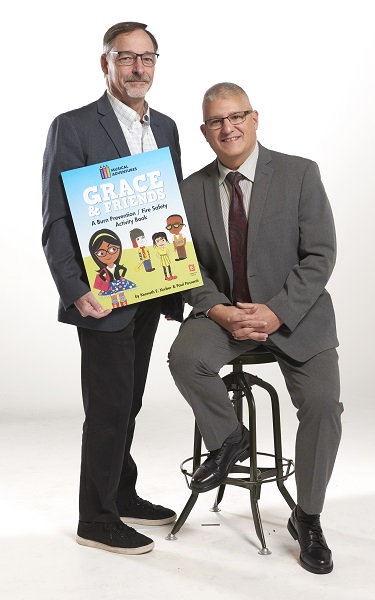PA Alumnus Paul Possenti is a COVID-19 Health Care Hero
October 7, 2020
 From joining active duty military to becoming a physician assistant (PA), from joining forces with a fellow Drexel alum to write a children’s book about burn prevention to becoming a healthcare hero in the time of COVID, Paul Possenti (`90 HUH) has always had purpose.
From joining active duty military to becoming a physician assistant (PA), from joining forces with a fellow Drexel alum to write a children’s book about burn prevention to becoming a healthcare hero in the time of COVID, Paul Possenti (`90 HUH) has always had purpose.
While studying pre-med at the State University of New York, Cortland, Possenti discovered the career he ultimately wanted to pursue, and he knew he wanted to go to Hahnemann University, a predecessor institution to Drexel. “I found out about the Physician Assistant program, and it was a perfect match for me,” Possenti said. He also applied to Yale, among other schools, “but I really wanted to go to Hahnemann.” He was drawn to the clinical rotation schedule---each rotation is six weeks, whereas many other institutions have four or five week rotations. Possenti thinks students benefit from a longer stint so their instructors can grow to trust them with harder or more intermediate tasks.
Once enrolled, he knew he had made the right decision. “I loved the instructors and professors,” he reflected, “and I got to see a little bit of everything – pediatrics, ob-gyn, orthopedics - that helped me develop all my skills, so that when I specialized, I could put those skills to use.” Possenti particularly enjoyed his preceptorship in emergency medicine at Community General Hospital in Reading, PA, where he realized his passion for treating trauma patients. Throughout his education, he also honed his skills in surgery. “There’s a lot of high acuity in surgery,” Possenti explained. He felt fortunate to be able to practice it on rotation. “It gave me a good look at it and made me say ‘yeah, that’s what I want to do,’ and it made me love surgery even more.”
He completed several of his rotations in Connecticut and was even offered a job at one of his sites, Bridgeport Hospital, the day after he graduated from the program. Thirty years later, Possenti is still working as a PA at Bridgeport, “and I haven’t had a break since!” he joked.
 He has climbed the ranks at Bridgeport, starting in the Department of Surgery and Connecticut Burn Center, becoming clinical coordinator of Trauma, then chief surgical PA before assuming his current position as director of Trauma Services, Emergency Management, Emergency Medical Services, Security and Parking and chairman of Environmental Care and Space. “I was fortunate to get into administration – I oversee all these different things you wouldn’t think a PA could do,” he said. It is because of his leadership roles, operational experience and military background that he has been able to make an incredible impact on managing COVID-19 treatment at Bridgeport.
He has climbed the ranks at Bridgeport, starting in the Department of Surgery and Connecticut Burn Center, becoming clinical coordinator of Trauma, then chief surgical PA before assuming his current position as director of Trauma Services, Emergency Management, Emergency Medical Services, Security and Parking and chairman of Environmental Care and Space. “I was fortunate to get into administration – I oversee all these different things you wouldn’t think a PA could do,” he said. It is because of his leadership roles, operational experience and military background that he has been able to make an incredible impact on managing COVID-19 treatment at Bridgeport.
As director of Emergency Management, it was up to Possenti to ready the hospital for the onslaught of COVID patients. He and other hospital leaders began tracking the virus in January, weeks before it reached the US. Thanks to the emergency plans already in place, the hospital staff was ready to act. Many regular rooms were converted to negative pressure rooms, making it harder for the virus to spread. Leadership made sure to have an adequate supply of PPE and ventilators. They erected a 32-bed hospital tent in which to treat non-COVID patients, not only freeing up space in the hospital, but preventing unnecessary exposure.
Although now in the recovery phase, at the peak in mid-April, Bridgeport Hospital saw around 250 COVID positive patients, 60 of which were in the ICU and 55 of those on ventilators – but because of their thorough preparations, they never once ran out of beds or ventilators.
In addition to his administrative roles, Possenti continues to work as a practicing PA. Throughout the peak of the surge, he would regularly end his shift and head to the surgical ICU’s COVID-19 and trauma teams to help. In fact, it is a hallmark of the physician assistant that they are able to serve in many capacities. “As a PA, you have the opportunity to go into different types of medicine, it’s endless,” Possenti shared. If you decide a field is not for you, or if you are needed elsewhere, you can easily transition because “the education is so broad. Whereas a physician would have to start all over.” PAs were integral members of every COVID facing team at Bridgeport. Emergency department PAs worked in the triage tents, and cardiothoracic and general surgery PAs joined those in the ICU and surgical ICU, which was converted to a regular ICU, to run the COVID teams who treat the sickest patients.
“Through the pandemic, we have seen how PAs played a significant role and were a great asset,” said Possenti. And about becoming a PA himself, “It’s an amazing profession. Helping people in their time of need gives me purpose. If I had to do it all over again, I’d do the same thing.”
Possenti, along with classmate and friend Ken Korber, is a member of the 2020 Nurturing Purpose cohort.
Written by Maggie McCrea